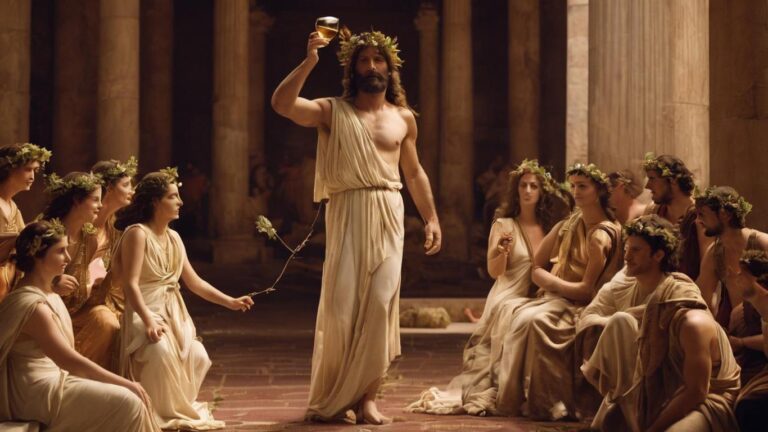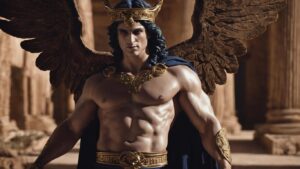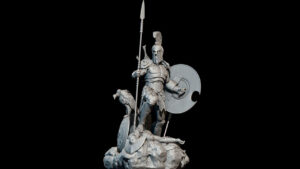Table of Contents
Who is Dionysus
The god of wine, grape harvest, fertility, ritual madness, religious ecstasy, and theater, stands prominent in Greek mythology. Born to Zeus and the mortal princess Semele, he holds a place among the Olympian deities. Dionysus, depicted as a youthful, effeminate figure carrying a thyrsus and often accompanied by satyrs and maenads, symbolizes the dual nature of life.
His myths weave themes of transformation, resurrection, and the celebration of life through revelry and wine. As a complex deity, Dionysus embodies both joyous and destructive aspects of existence. The Dionysian festivals, the Dionysia, held significance in ancient Greece, featuring theatrical performances and revelry in his honor. People in the Roman Empire extended this worship, knowing him as Bacchus.
Origins
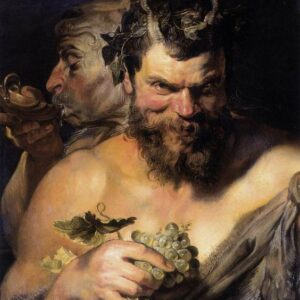
Dionysus’ origins present some interpretative challenges. Speculation suggests his name combines Zeus, his father, with Nysa, the mountain of his birth and upbringing.
Legends and Stories
Birth of Dionysus: he experienced a unique and miraculous birth. According to one version, Semele, a mortal princess, bore him as the son of Zeus, the king of the gods. However, tricked by the jealous Hera, Semele asked Zeus to reveal his true divine form while pregnant. The sight of Zeus’s true form incinerated Semele. To protect the unborn Dionysus, Zeus sewed him into his thigh until he was ready to be born.
Dionysus and the Pirates: Captured by unaware pirates, Dionysus, initially unrecognized as a god, defied attempts to bind him. Instead, vines enveloped the ship. Upon revealing his true identity, the crew recognized the god, panicked, and leaped overboard, transforming into dolphins. Only the helmsman, who acknowledged Dionysus and sought to shield him, was spared.
Dionysus and King Midas: Assisting Dionysus’s follower, Silenus, King Midas received a wish as gratitude. He desired the golden touch, but regretted it as it turned even his daughter to gold. Pleading with Dionysus, the god, in mercy, instructed Midas to cleanse himself in the river Pactolus to rid the golden touch.
Dionysus and the Maenads: The Maenads, fervent followers of Dionysus, engaged in ecstatic rituals. King Pentheus of Thebes opposed their worship, leading Dionysus to drive him mad. Pentheus met a gruesome end, torn apart by his own mother and other Maenads in a frenzied madness.
Dionysus in the Underworld: Dionysus’s association with the underworld involves myths where he descended to Hades to rescue his mother, Semele, and elevate her to the divine realms.
Dionysus and Ariadne: Ariadne, abandoned on Naxos after aiding Theseus against the Minotaur, was found and loved by Dionysus. They married, and her bridal crown became the constellation Corona Borealis.
Family
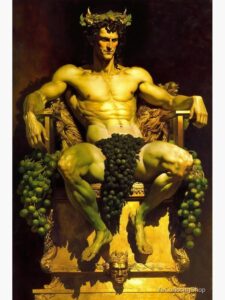
Zeus and Semele are the parents of Dionysus. However, due to the circumstances of his birth, some consider Dionysus to be the son of Zeus and a mortal woman. The story holds that Hera, the wife of Zeus and queen of the gods, was jealous of Semele and tricked her into asking Zeus to reveal his true form. When Zeus appeared in his divine glory, the mortal Semele couldn’t bear it, and she perished. Despite this, Zeus saved the unborn Dionysus by sewing him into his thigh until he was ready to be born.
Appearance
He is a youthful god tied to wine and joy, is often depicted with an ivy-crowned staff, showcasing his link to winemaking. Art depicts him with varied appearances, bearded or not, and clad in robes with a symbolic thyrsus, representing fertility and wild nature.
Symbology
The god of revelry and wine, actively embodies his character and influence through a variety of symbols. An iconic representation, the thyrsus, a staff crowned with a pine cone and wrapped in ivy vines, symbolizes fertility, abundance, and the untamed forces of nature. Both the god and his fervent followers actively carry this powerful symbol.
Grapes and vine imagery underline Dionysus’s close association with wine culture, signifying his dominion over winemaking, grape harvesting, and vineyard cultivation. Additionally, he wears a crown of ivy leaves, symbolizing his connection to the natural world and embodying the spontaneous and wild aspects of the festivities linked to the god.
Depicted with a panther or leopard, Dionysus emphasizes his untamed and unpredictable nature, highlighting his close association with the primal forces of the wilderness. In the realm of theater, he patronizes drama, with masks, especially the iconic comedy and tragedy masks, becoming associated with him, reflecting his profound influence on the dramatic arts.
Satyrs and Maenads, mythical beings actively integral to Dionysian symbolism, embody the wild, hedonistic, and ecstatic aspects of his worship. Satyrs, with their half-human, half-goat forms, and Maenads, frenzied female worshippers, actively add a dynamic and vibrant dimension to the god’s symbolism, enhancing the overall portrayal of Dionysus as a deity of celebration and unrestrained revelry.

FAQ
What is Dionysus the god of?
Dionysus is the god of wine, fertility, theater, religious ecstasy, and revelry in Greek mythology.
Who is Dionysus?
Dionysus is one of the twelve Olympian gods in Greek mythology. He is the son of Zeus and the mortal Semele.
How to pronounce Dionysus?
Dionysus is pronounced "die-uh-NYE-sus."
What is Dionysus's symbol?
Dionysus is often associated with symbols like the grapevine, wine, the thyrsus (a staff topped with a pine cone and twined with ivy), and the leopard.
Who are Dionysus's parents?
Dionysus's parents are Zeus, the king of the gods, and Semele, a mortal princess.
What is Dionysus's Roman name?
In Roman mythology, Dionysus is known as Bacchus.
How was Dionysus born?
Dionysus was born from the union of Zeus and the mortal Semele. He was born prematurely when Semele was consumed by the fire of Zeus's lightning, but Zeus rescued the unborn Dionysus and sewed him into his thigh until he was ready to be born.
How did Dionysus become a god?
Dionysus became a god through his extraordinary birth, survival, and subsequent rise to divine status. His association with wine, celebrations, and religious rituals played a role in his recognition as a god.
Where does Dionysus live?
Dionysus is considered one of the Olympian gods and resides on Mount Olympus, the mythical home of the gods in Greek mythology.
What are Dionysus's powers?
Dionysus is associated with various powers, including the ability to inspire madness, creativity, and religious ecstasy. He is also linked to the cultivation of grapes and the production of wine.
What does Dionysus mean?
The name Dionysus is derived from the Greek words "Dios," meaning Zeus, and "Nysa," referring to a mythical mountain. Therefore, Dionysus is often interpreted as "Zeus of Nysa" or "he who belongs to Zeus of Nysa."
How to worship Dionysus?
Historically, worship of Dionysus involved festivals, rituals, and celebrations. Participants would engage in processions, theatrical performances, and the consumption of wine. Devotees believed that participating in these activities could lead to a closer connection with the god and invoke his blessings. However, the specifics of worship would vary across different regions and time periods.
